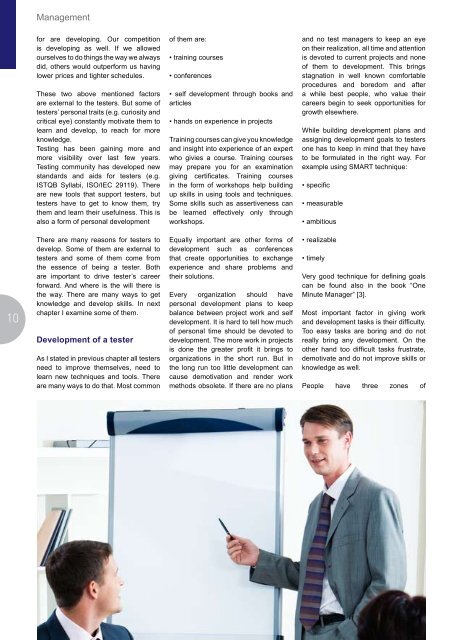Comparison of Change Management Systems
Comparison of Change Management Systems
Comparison of Change Management Systems
Create successful ePaper yourself
Turn your PDF publications into a flip-book with our unique Google optimized e-Paper software.
10<br />
<strong>Management</strong><br />
for are developing. Our competition<br />
is developing as well. If we allowed<br />
ourselves to do things the way we always<br />
did, others would outperform us having<br />
lower prices and tighter schedules.<br />
These two above mentioned factors<br />
are external to the testers. But some <strong>of</strong><br />
testers’ personal traits (e.g. curiosity and<br />
critical eye) constantly motivate them to<br />
learn and develop, to reach for more<br />
knowledge.<br />
Testing has been gaining more and<br />
more visibility over last few years.<br />
Testing community has developed new<br />
standards and aids for testers (e.g.<br />
ISTQB Syllabi, ISO/IEC 29119). There<br />
are new tools that support testers, but<br />
testers have to get to know them, try<br />
them and learn their usefulness. This is<br />
also a form <strong>of</strong> personal development<br />
There are many reasons for testers to<br />
develop. Some <strong>of</strong> them are external to<br />
testers and some <strong>of</strong> them come from<br />
the essence <strong>of</strong> being a tester. Both<br />
are important to drive tester’s career<br />
forward. And where is the will there is<br />
the way. There are many ways to get<br />
knowledge and develop skills. In next<br />
chapter I examine some <strong>of</strong> them.<br />
Development <strong>of</strong> a tester<br />
As I stated in previous chapter all testers<br />
need to improve themselves, need to<br />
learn new techniques and tools. There<br />
are many ways to do that. Most common<br />
<strong>of</strong> them are:<br />
• training courses<br />
• conferences<br />
• self development through books and<br />
articles<br />
• hands on experience in projects<br />
Training courses can give you knowledge<br />
and insight into experience <strong>of</strong> an expert<br />
who givies a course. Training courses<br />
may prepare you for an examination<br />
giving certificates. Training courses<br />
in the form <strong>of</strong> workshops help building<br />
up skills in using tools and techniques.<br />
Some skills such as assertiveness can<br />
be learned effectively only through<br />
workshops.<br />
Equally important are other forms <strong>of</strong><br />
development such as conferences<br />
that create opportunities to exchange<br />
experience and share problems and<br />
their solutions.<br />
Every organization should have<br />
personal development plans to keep<br />
balance between project work and self<br />
development. It is hard to tell how much<br />
<strong>of</strong> personal time should be devoted to<br />
development. The more work in projects<br />
is done the greater pr<strong>of</strong>it it brings to<br />
organizations in the short run. But in<br />
the long run too little development can<br />
cause demotivation and render work<br />
methods obsolete. If there are no plans<br />
and no test managers to keep an eye<br />
on their realization, all time and attention<br />
is devoted to current projects and none<br />
<strong>of</strong> them to development. This brings<br />
stagnation in well known comfortable<br />
procedures and boredom and after<br />
a while best people, who value their<br />
careers begin to seek opportunities for<br />
growth elsewhere.<br />
While building development plans and<br />
assigning development goals to testers<br />
one has to keep in mind that they have<br />
to be formulated in the right way. For<br />
example using SMART technique:<br />
• specific<br />
• measurable<br />
• ambitious<br />
• realizable<br />
• timely<br />
Very good technique for defining goals<br />
can be found also in the book “One<br />
Minute Manager” [3].<br />
Most important factor in giving work<br />
and development tasks is their difficulty.<br />
Too easy tasks are boring and do not<br />
really bring any development. On the<br />
other hand too difficult tasks frustrate,<br />
demotivate and do not improve skills or<br />
knowledge as well.<br />
People have three zones <strong>of</strong>



